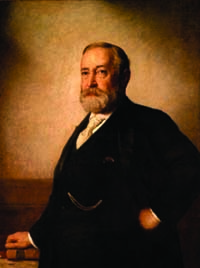
23 – Benjamin Harrison (1889-1893)
Born and raised in Ohio, grandson of the 9th president, and great-grandson of Benjamin Harrison V who signed the Declaration of Independence, Benjamin Harrison studied law and then moved to Indiana. During the Civil War, he joined the Union army as an officer and served under Sherman, rising to the rank of brigadier general. Following a 6-year stint as senator, Harrison won the presidential election by electoral and not popular vote. The budget grew considerably during his presidency. An aloof and reserved individual, Harrison gained the nickname of the “human iceberg.” His administration is remembered for the signing of Sherman Antitrust Act which sought to regulate large monopolies and the addition of six states to the United states: Montana, Wyoming, North Dakota, South Dakota, Washington, and Idaho. Ironically, he lost the election for a second term to Cleveland, the man he had previously beaten.
“No other people have a government more worthy of their respect and love or a land so magnificent in extent, so pleasant to look upon, and so full of generous suggestion to enterprise and labor.”
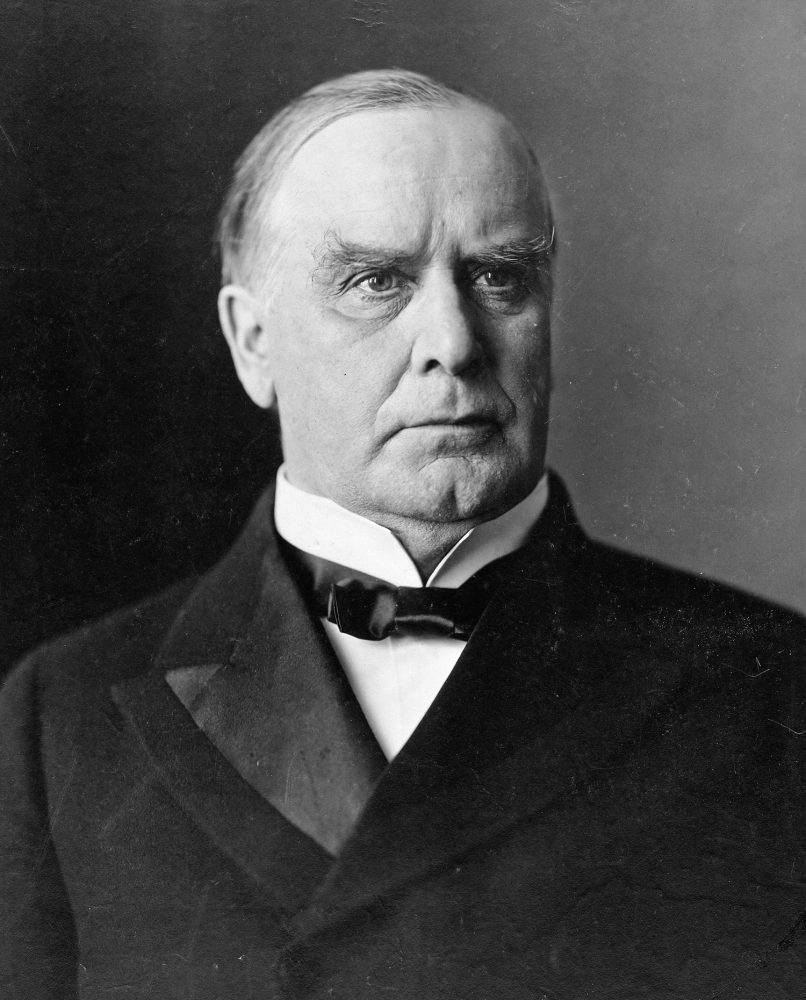
25 – William McKinley (1897-1901)
Born in Ohio, William McKinley began his career as a country-school teacher and postal clerk, enlisted as a private in the Union army fighting in the Battle of Antietam and rising to the rank of major, and then studied law. At 34, he landed a seat in the House of Representatives where he honed his expertise on tariffs, after which he returned home to serve two terms as Ohio’s governor. McKinley ran for the presidency against William Jennings Bryant, a progressive of Scopes trial fame. Early during his tenure, the United States fought a 100-day Spanish- American War for Cuba’s independence from Spain. During his presidency, Hawaii was also added as a territory. To promote U.S. industry, McKinley supported the highest tariffs ever on foreign goods. An anarchist named Czolgosz shot the president in Buffalo, New York where he died 8 days later. In a last gesture of courage and strength, McKinley sought to protect his attacker from the mob gathering around him.
“War should never be entered upon until every agency of peace has failed.”
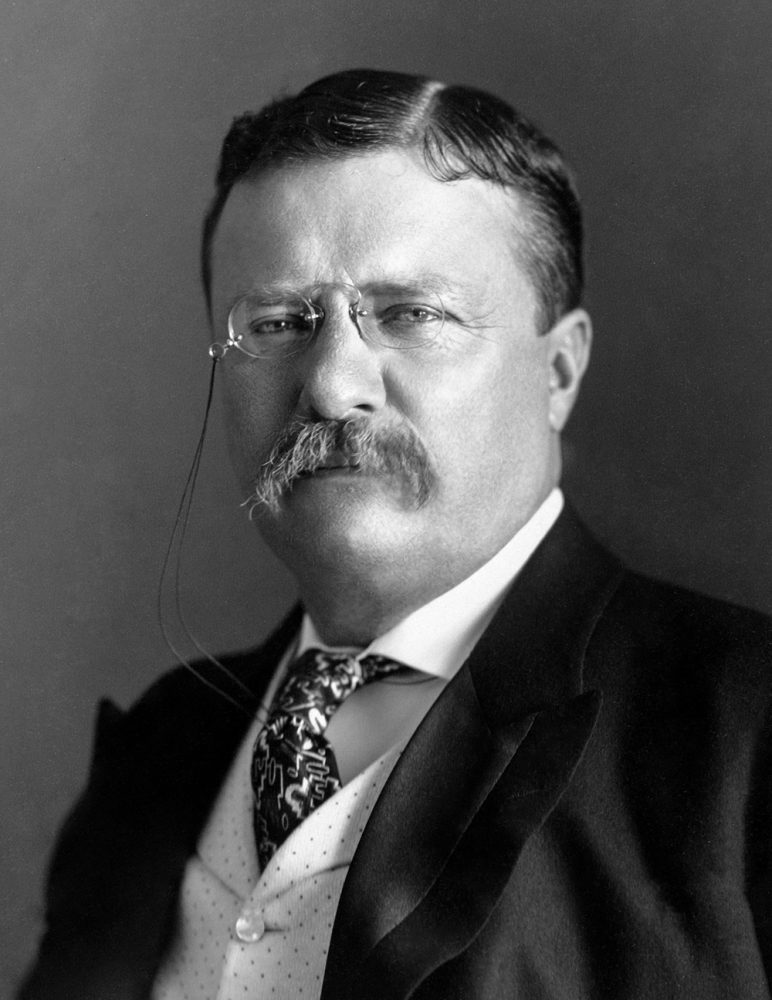
26 – Theodore Roosevelt (1901-1909)
At McKinley’s untimely death, the presidency fell to his 42-year-old vice-president, Theodore Roosevelt, the youngest person yet to serve in this role. McKinley’s first vice-president, Garret Hobart, died and Roosevelt proved a handy vice-presidential replacement for McKinley’s second term. Roosevelt, a sickly child with asthma who grew up in New York, developed a lifelong passion for exercise and a passion for hard work. After losing his wife and mother on the same day, he retreated to the outdoors for recovery. Prior to the presidency, Roosevelt’s career spanned police commissioner for New York city, writer, governor of New York, McKinley’s secretary of navy, and renowned leader of the Rough Riders during the Spanish-American War. As president, he promoted the “Square Deal” program which described his domestic program and promised the average citizen a fair shake. He used executive orders to create national parks and to settle a Pennsylvanian coal strike. Roosevelt believed that the government could and should regulate big business for the good of the people. The first president to leave the country, he traveled to the Panama Canal construction site to check on its progress. In addition to his conservation efforts, Roosevelt made great strides in building up the navy.
“Speak softly and carry a big stick.”
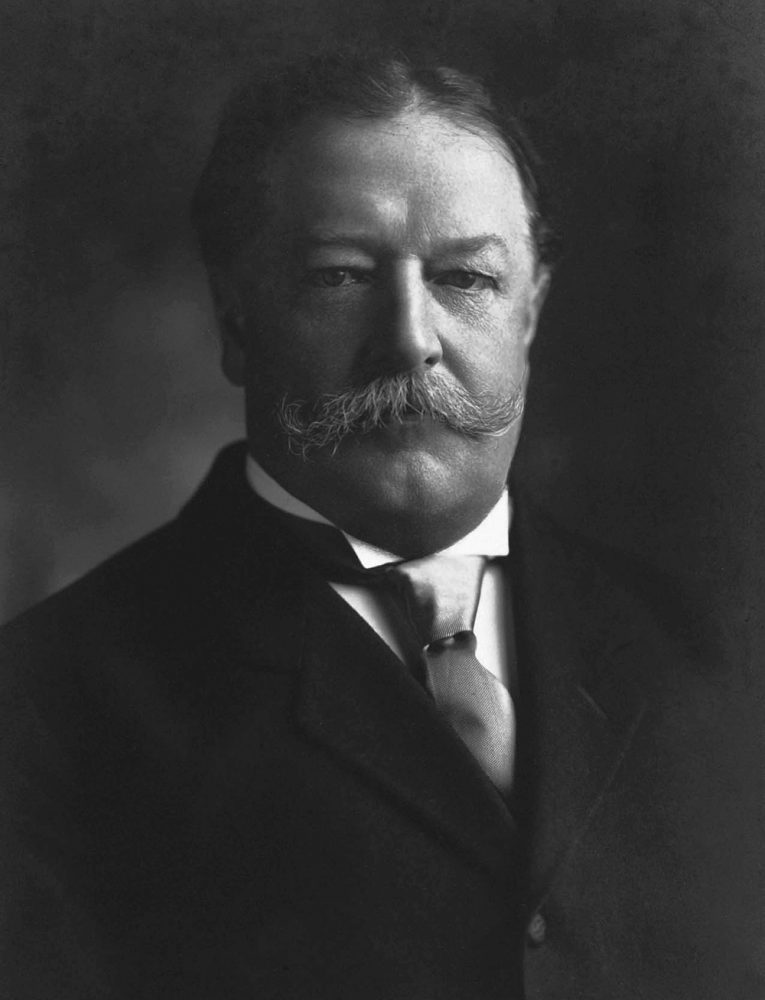
27 – William Taft (1909-1913)
Another Ohioan, William Taft started out as a lawyer and then served in a series of judgeships. He longed to become a justice on the supreme court, but his wife, Helen, urged him to go for president. In this pursuit, Taft helped the Filipinos set up their government and served as Roosevelt’s secretary of war. As president, he oversaw the addition of the 16th and 17th amendments which initiated the income tax and allowed senators to be elected directly.
In the beginning, he continued many of Roosevelt’s policies but gradually drifted away, most notably by signing a tariff reduction bill and dismissing the chief forester of the U.S. In his post-presidential years, he taught at Yale Law School and was appointed chief justice in the Supreme Court where he served for nine years, the only president to also serve as a justice.
Taft, a large man—about 6 feet tall and up to 350 pounds in weight, ordered a special bathtub to accommodate his size.
“Presidents come and go, but the Supreme Court goes on forever.”

28 – Woodrow Wilson (1913-1921)
Born in Virginia, Woodrow Wilson spent some of his childhood in Augusta, GA; Columbia, SC; and Wilmington, NC. As a youth, he experienced the Civil War firsthand, witnessing Union troops marching into Augusta and his mother tending wounded Confederate soldiers. He held a doctorate in political science, taught in several universities, and served as president of Princeton before becoming New Jersey’s governor for 2 years. He won a hotly contested presidential election against William Taft and Theodore Roosevelt. During his tenure, Wilson oversaw the passage of the 19th Amendment giving women voting rights and created the Federal Reserve Board with ability to adjust interest rates. For 3 years, he struggled to remain neutral during World War I but, eventually, the German sinking of boats with Americans on board drew the U.S. into the fray. During the 1919 Paris peace talks, Wilson contracted the Spanish flu that had swept much of the world with many of his inner circle also getting ill. During his last year of office, Wilson suffered a serious stroke, leaving his wife Edith to carry out business. Wilson envisioned a League of Nations to resolve international disagreements, but U.S. never joined the organization once it was formed.
“If you think too much about being re-elected, it is very difficult to be worth reelecting.”
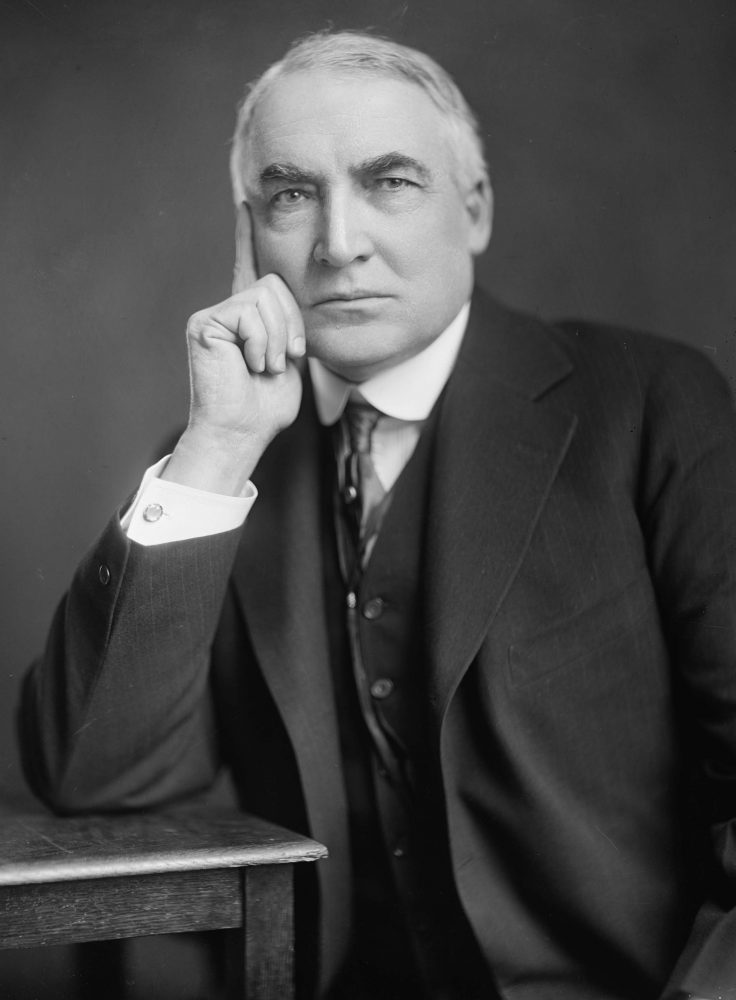
29 – Warren Harding (1921-1923)
Another Ohioan and the son of two doctors, Warren Harding worked in several fields including teaching, law, insurance, journalism, and publishing newspapers prior to becoming president. Elected as a senator for Ohio in 1914, Harding missed many of the sessions. Nonetheless, a friend nominated him for president because he looked the part and amazingly, he won by a landslide with 60% popular vote. Although his views on civil rights and race were evolved, Harding’s administration got bogged down in corruption, most notably the Teapot Scandal where his secretary of the interior accepted bribes, and not discovered until after his death. Harding had personal struggles with affairs and gambling yet his administration accomplished some milestones such as investing in energy resources of the Middle East and working with England and Japan to limit warships. He cut taxes for individuals and for corporations, set protective tariffs, created an approach to federal budget, opposed the League of Nations, and limited immigration. While on a cross-country tour during which he was the first present to visit Alaska, Harding died from apparent heart failure.
“America’s present need is not heroics but healing; not nostrums but normalcy.”
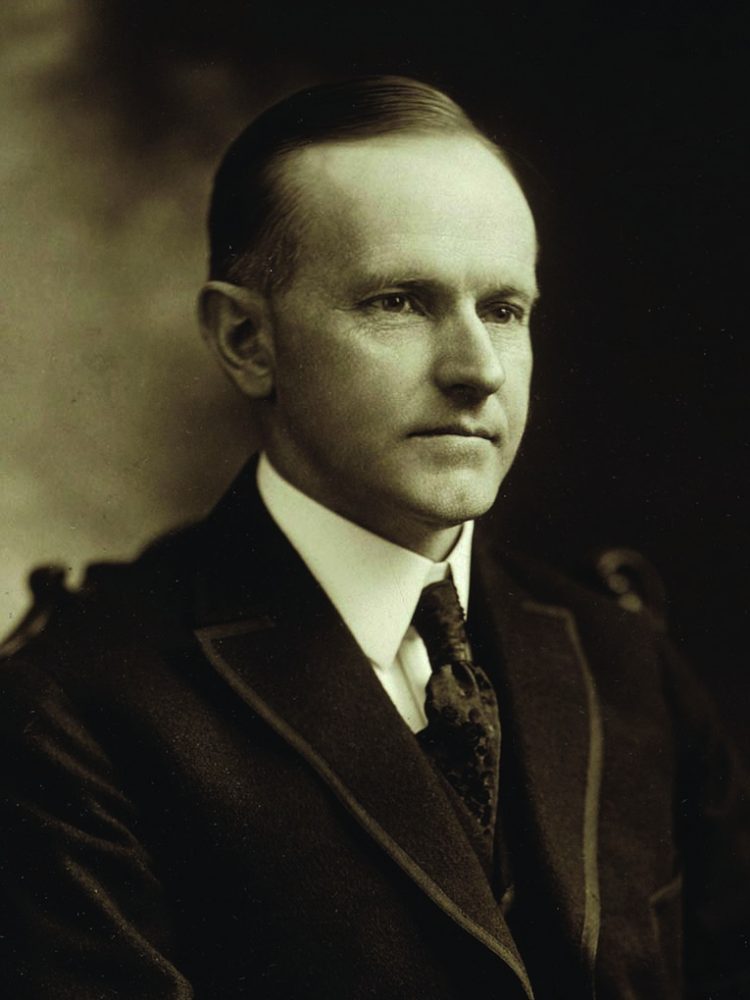
30 – Calvin Coolidge (1923-1929)
At Harding’s sudden passing, Calvin Coolidge took the reigns as president. John Coolidge, a justice of the peace, swore his own son in as president in the middle of the night. Coolidge, born in Vermont on July 4th, began his legal and later political career in Massachusetts, and worked his way up through local politics to governor of Massachusetts. His handling of a Boston police strike increased his name-recognition and led to his selection as vice president. Noted for his quiet demeanor, Coolidge believed in minimizing government interference to promote business growth and in “avoiding the big problems.” He and his wife Grace drew attention to the plight of the deaf and often collected funds to help that cause. Coolidge rode an electrical mechanical horse for exercise, loved animals, and was the first president to visit Cuba. Spending his later years writing his memoirs, Coolidge recognized that his approach may have led, in part, to the economic downturn occurring after he left office.
“To live under the American Constitution is the greatest political privilege that was ever accorded to the human race.”
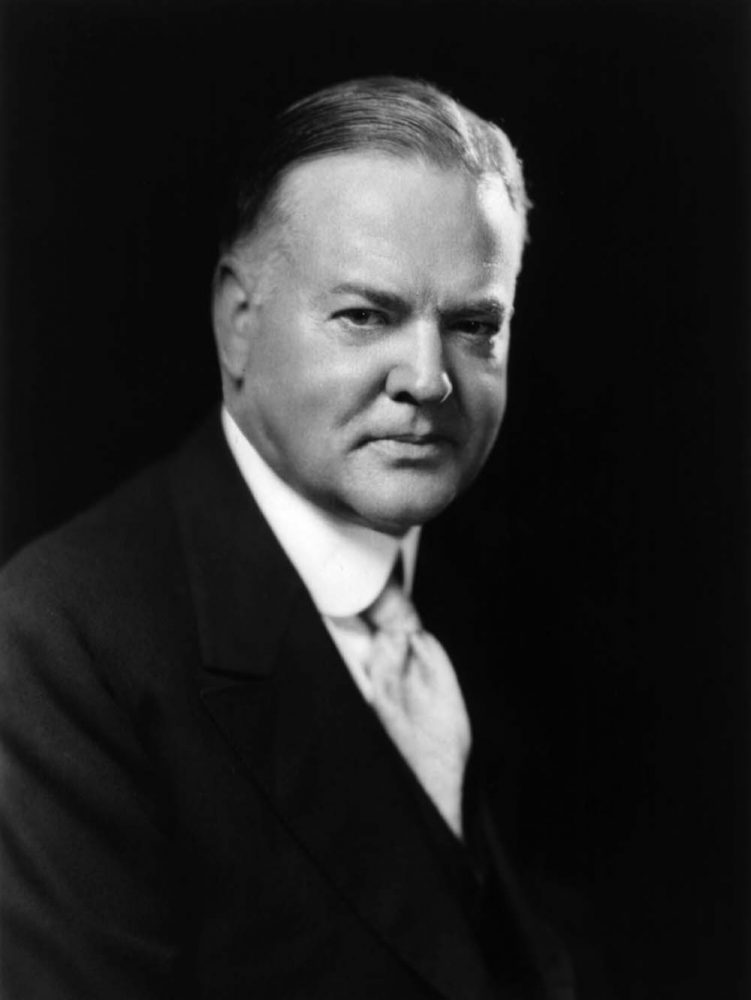
31 – Herbert Hoover (1929-1933)
With a degree in geology, Herbert Hoover, an Iowan of Quaker faith orphaned at age 9, began his mining career pushing ore carts. By age 40, he had become a self-made millionaire. When World War I began, Hoover played a key role in helping stranded Americans in Europe return to the U.S. He directed several major humanitarian efforts to distribute food to the hungry in war-torn Europe and came to be known as the “food czar.” Serving as secretary of commerce under both Harding and Coolidge, Hoover easily won the 1928 presidential election, his first campaign for political office. Soon afterwards, he faced the Great Depression of 1929 which dominated his presidency.
Hoover really believed that the crisis would self-correct and that the federal government was limited in what it could do. He vetoed measures aimed at a national employment system and national relief but did lower taxes. Near the end of his term, he created the Reconstruction Finance Corporation to provide loans for businesses which did help. His administration was responsible for jailing Al Capone; starting several major building projects such as the Bay Bridge in San Francisco, U.S. Supreme Court Building, and the Hoover Dam; and reserving 2.2 million acres of land for parks. At the end of his term, the first president to come from west of the Mississippi River returned to private business and humanitarian work.
“Blessed are the young for they shall inherit the national debt.”

32 – Franklin Delano Roosevelt (1933-1945)
The only president to win four terms, Franklin Delano Roosevelt grew up as an only child in a wealthy family from Hyde Park, New York with the best education including tutors, private school, and Harvard University. He married Eleanor Roosevelt, his fifth cousin once removed and the niece of Theodore Roosevelt who gave her away at their wedding.
Starting out in state politics, he then served as Wilson’s assistant secretary of the navy. After failed senate and vice presidential bids, Roosevelt returned to being a New York lawyer.
At 39, he fell ill with polio (some say Guillain-Barre Syndrome) which left him permanently paralyzed from the waist down. While recovering, Roosevelt immersed himself in his lifelong passion for stamp-collecting and finally returned to politics as New York’s governor. His leadership in that state so impressed a stricken nation that he was elected president.
Where Hoover had been slow to act, Roosevelt spoke to the nation through fireside chats on the radio and promoted the “New Deal,” stabilizing the banks, creating infrastructure jobs with the Civilian Conservation Corps and the Civil Works Administration, and putting into place the Social Security Act to protect the elderly and unemployed.
When Japan attacked Pearl Harbor on 12/7/1941, drawing America into WWII, Roosevelt embraced the role of wartime president but never saw that war’s end. He died suddenly from a cerebral hemorrhage in April 1945 at his beloved Warm Springs Georgia home.“
“The only thing we have to fear is fear itself.”
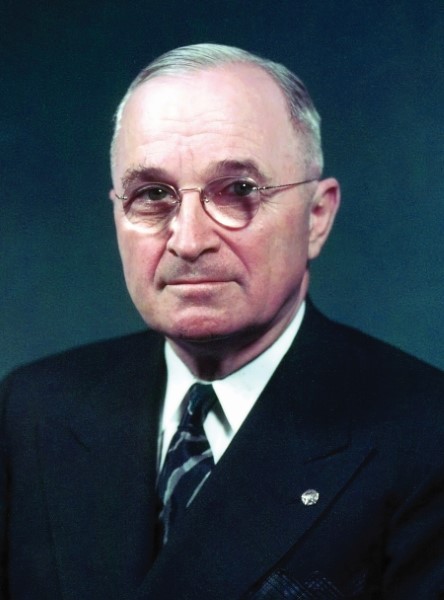
33 – Harry S. Truman (1945-1953)
The presidency then fell upon the shoulders of this plain-spoken man from Missouri named Harry S. Truman who had been selected to replace Henry Wallace, considered too liberal by some, as Roosevelt’s running mate in the 1944 election. Truman is most remembered for finally ending WWII by dropping two atomic bombs on Japan. The son of poor farmers and the only 20th century president not to graduate from college, Truman desperately wanted to attend West Point, but his poor eyesight and thick glasses precluded that. Serving in WWI as part of the Missouri National Guard, Truman returned home to unsuccessfully run a men’s clothing store before becoming a U.S. senator. To stop the bloodshed and end WWII, he made the difficult decision to drop two atomic bombs on Japan. His first bid to win a presidential election in 1948 produced such an unexpected victory over the favored Thomas Dewey that the Chicago Daily Tribune erroneously printed the headline “Dewey Defeats Truman.” His administration produced the Truman Doctrine meant to stop the spread of communism, the Marshal Plan to rebuild war-torn nations, the Fair Deal as domestic policy, strong support for the United Nations, and the start of the cold war. His presidency saw the difficult Korean War played out while in the senate, Joseph McCarthy sought to expose and to blacklist supposed communist sympathizers. Of note, whether to place a period after the “S” in Truman’s name became a controversy since he had no middle name and the letter was meant to honor both his grandfather’s names.
Plaque Truman kept on his desk–“The buck stops here.”

34 – Dwight Eisenhower (1953-1961)
Born in Texas and raised in Kansas, Dwight Eisenhower graduated from West Point and went on to become the renowned five-starred general who led the allied forces to a decisive victory over the Germans on D-Day. He held many significant army posts including Supreme Commander of the Allied Forces of Africa and then of Europe before returning home to lead Columbia University as its president for a brief unhappy stint and serving as the first Supreme Allied Commander of NATO.
In the 1952 presidential election under the banner of “I like Ike,” Eisenhauer won a landslide victory over democrat Adlai Stevenson. His administration oversaw many positive accomplishments including the Korean War’s end, the construction of interstate highways, the creation of NASA, the end of McCarthyism, the desegregation of the armed forces, the start of school desegregation, and the passage of the Civil Rights Acts of 1957 and 1960.
During his time in office, Eisenhower suffered a heart attack but still easily won a second term over Stevenson. With respect to his personal life, Eisenhower and his wife Mamie had two sons, the first of which died of scarlet fever during childhood.
He renamed the presidential retreat from Shangri-La to Camp David after his grandson and in 1961 retired to his home near Gettysburg, PA.
He was an avid golfer, member at Augusta National and painter, producing over 200 pictures during his lifetime.
“I hate war as only a soldier who has lived it can, only as one who has seen its brutality, its futility, its stupidity.”
Continue to Next Page

